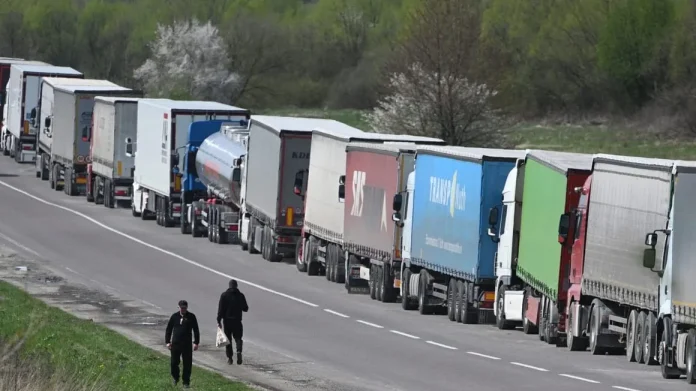About 20,000 Ukrainian trucks are stuck at three crossings after Polish transport workers started protests under the slogan “Committee for Defence of Truckers and Employers in Logistics.”
Previously unknown to the public, the group is organising demonstrations without any official support from politicians or political parties.
The protest is blocking traffic in both directions at the Dorohusk and Hrebenne-Rawa Ruska crossings, as well as exit traffic through Korczowa.
Demonstrators are demanding to restrict the entry of Ukrainian trucks into Poland by introducing permits and prohibiting the establishment of trucking companies in Poland with capital from outside the European Union. Both demands are aimed at protecting the interests of Polish truckers while potentially affecting Polish consumers.
Polish hauliers are facing competition from Ukrainian truckers after sanctions led to the loss of substantial business in delivering goods to Russia and Belarus.
In 2016, when the Deep and Comprehensive Free Trade Area between Ukraine and the EU came into force, the country was given a quota of 200,000 permits to cross the border with Poland.
However, in the following years from 2016 to 2021, Ukraine’s trade with the EU grew by 45 per cent. Tymofiy Mylovanov, rector of the Kyiv School of Economics (KSE) and former economics minister, stated that Poland increased permit quotas for Russia and Belarus while reducing the Polish permit quota for Ukraine to only 120,000, which violated international agreements.
The quota issue for Ukrainian trucks was solved in June 2022 when the Ukraine-EU freight agreement came into force, effectively eliminating the need for permits altogether, and traffic increased dramatically.
In April, Poland imposed a ban on imports of Ukrainian grain, which was supposed to transit through the country to reach international markets, after cheap grain collapsed Poland’s domestic grain market.
The European Commission intervened and imposed a five-month ban on imports of Ukrainian grain into the EU, but when the ban expired on 15 September, Poland unilaterally and illegally extended it for an indefinite period. Ukraine responded by suing Poland, Slovakia and Hungary, which had imposed the ban to protect their domestic farmers.
Now these companies are doing whatever they want. There is a complete, uncontrolled influx, just like with grain.
A new trade scandal over the increased flow of Ukrainian lorries through Poland to Western European markets highlights the difficulties Ukraine will face in its EU accession application, which will start with the formal negotiations in December.
After accession, Ukraine will become one of the largest EU countries, ahead of Germany and Poland, and will therefore consume huge resources in the form of grants for infrastructure and agriculture.
Ukraine, as an agricultural nation, is expected to flood EU producers with its huge production at much lower prices. Ukrainian and Polish ministers are negotiating to resolve these trade disputes. Kyiv is adamant that there will be no return to the truck permit system, pointing out that the previous government has already violated trade agreements.
The blocking of Ukrainian trucks and therefore exports comes at a time when the Ukrainian government is facing enormous financial pressure to pay for its war with Russia. Moscow’s embargo on grain exports by sea has already left Ukraine with a growing trade deficit.
Ukraine’s ambassador to Poland has called the border fences “a painful stab in the back of Ukraine.” Ukraine’s Deputy Infrastructure Minister, Serhiy Derkach, declared:
“The blockade is just an opportunity to block the border for Ukrainian competitor truckers. They account for 85% of those who cross the Ukrainian-Polish border to bring goods into Ukraine or export goods.”
